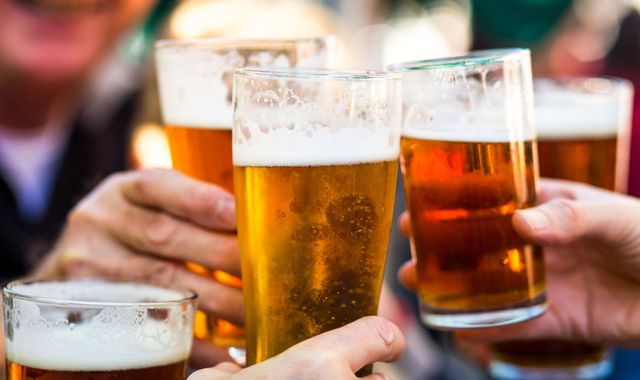Professor David Nutt: Former drug tsar says alcohol is most dangerous drug
Written by News on 16/01/2020
Alcohol is the most dangerous drug and is far more toxic and addictive than laughing gas, the government’s former chief drug adviser has said.


Professor David Nutt was sacked as the government’s drug tsar in 2009, a day after claiming that ecstasy and LSD were less dangerous than alcohol.
The professor claimed in a research paper that alcohol and tobacco were more harmful than many illegal drugs including LSD, ecstasy and cannabis.
He stands by the claim and believes “alcohol is the most damaging drug in pretty much every Western country”.
Professor Nutt has spoken as the revised second edition of his 2012 book Drugs Without The Hot Air is published.
He said that, if looking at the UK, alcohol is the most harmful drug overall.
Professor Nutt added: “Every family in Britain is damaged to some extent by alcohol. If not in terms of physical or psychological damage, then in terms of the financial damage that excess drinking causes.”
He said one thing that has become “very clear” over the last 10 years is that “there has been absolutely no action whatsoever on the fact alcohol is the most harmful drug”.
Professor Nutt also said there was a continued attempt to undermine the harm of alcohol by saying it has health benefits.
But, he argued, any health gains from alcohol are limited to consumption of 5g of alcohol per day – the equivalent of sharing one 175ml glass of wine between three people.
Professor Nutt also said nitrous oxide, known as laughing gas and sometimes hippy crack, is a “great British discovery” used for pain relief such as in childbirth.
He said the drug is fun “without the risks of alcohol”, adding: “Its effect is over in a few minutes – you’re perfectly safe, you can go back home, you can drive, you’re not going to be mugged, you’re not going to have a hangover.”
Professor Nutt said it represents “a logical alternative to alcohol for those people who don’t want to be impaired and it’s less toxic and less addictive”.
However, the supply of nitrous oxide for recreational purposes is illegal.
Professor Nutt also told journalists that the UK “breaks the record for the number of deaths from opiates” every year, yet the deaths have fallen dramatically in other countries.
Possession of all drugs was decriminalised in Portugal in 2004, with a particular emphasis on opiates, which led to a huge drop in death rates.
The professor said: “In the last government, drug ministers went to Portugal and said ‘Oh yes, it works’ but we don’t do anything about it.
“This is one of the worst examples of ignoring international evidence.”
Professor Nutt also said fentanyl, a powerful synthetic opioid that is similar to morphine but is 50 to 100 times more potent, is a growing problem in the UK.
He said: “Fentanyl is being put into all sorts of drugs because it’s a very powerful drug.
“It gives you a powerful effect and it’s very cheap.
“Unless we do something, we will get a growing problem with fentanyl.”
He said that because policy had been trying to eliminate heroin and not putting enough people into treatment programmes, people will turn to other drugs such as fentanyl instead.
The professor said: “The black market looks for alternatives. Fentanyl is 50 times as powerful as heroin and a third of the price.”
He added that profit margins for fentanyl “are enormous and so now the black market is moving to fentanyl”.
“Trying to stop people using heroin has led this terrible monster … there are 80 different fentanyls detected in Britain,” said Professor Nutt.
He is calling for drug policy to be moved from the control of the Home Office to the Department of Health, for widespread drug testing and for regulated access to drugs less harmful than alcohol.
A cross-party group of MPs said in October that some drug offences should be decriminalised in an attempt to stem the rising number of related deaths.
A spokesman for the Alcohol Information Partnership, which is funded by the alcohol industry, said: “Professor Nutt’s focus on the effects of harmful drinking should not be allowed to detract from the fact that, as evidenced by the latest government figures, our relationship with alcohol has changed significantly over recent years, with the vast majority of UK citizens drinking alcohol within the recommended guidelines.
“We know there is still work to be done to tackle excessive drinking within certain groups but let’s not forget that most people drink for pleasure with friends and family, rather than to get drunk.”
(c) Sky News 2020: Professor David Nutt: Former drug tsar says alcohol is most dangerous drug







